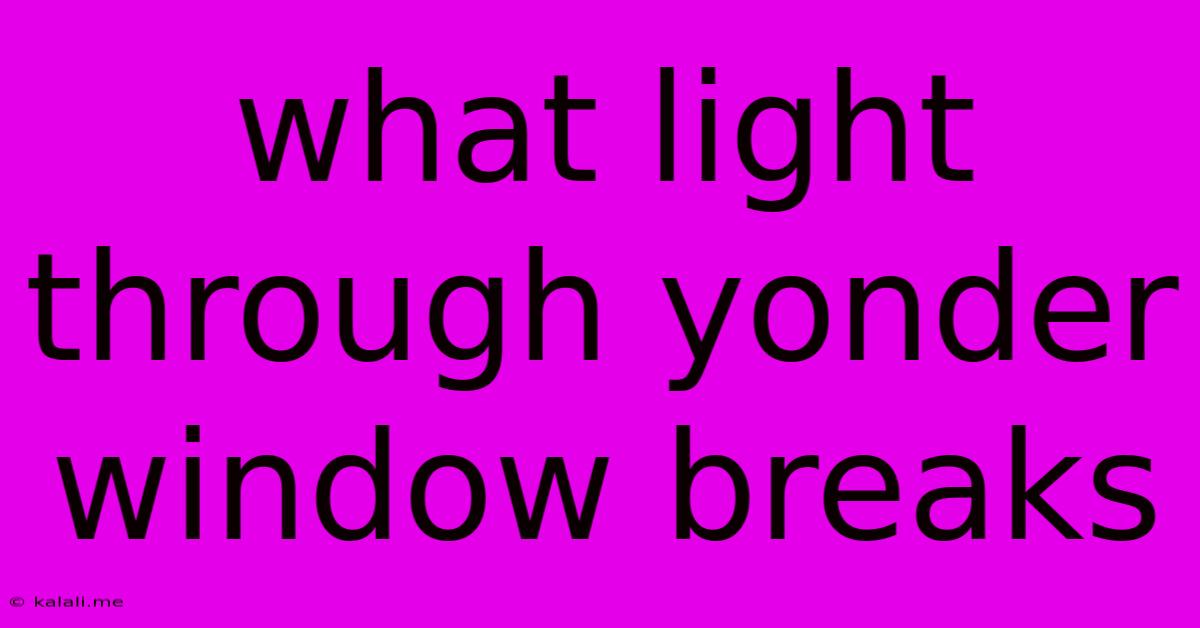What Light Through Yonder Window Breaks
Kalali
May 30, 2025 · 3 min read

Table of Contents
What Light Through Yonder Window Breaks: Exploring Shakespeare's Famous Line
Shakespeare's words often resonate with a timeless power, and few lines capture the imagination quite like, "What light through yonder window breaks?" This seemingly simple phrase, from Romeo and Juliet, is laden with symbolism, dramatic irony, and poetic beauty. It's a line that invites exploration of its context, meaning, and enduring legacy. This article delves into the intricacies of this iconic quote, examining its role in the play and its lasting impact on literature and popular culture.
The Context: Romeo's Awakening and Juliet's Beauty
The line appears in Act II, Scene II, a pivotal scene in the play. Romeo, having just scaled the wall of the Capulet orchard, discovers Juliet at her window. He is captivated by her beauty and the unexpectedness of their secret meeting. The "light" he sees isn't just physical sunlight; it's the metaphorical light of Juliet's presence, illuminating his world and changing his perspective. This sudden, unexpected encounter is the culmination of a whirlwind romance, fueled by passion and secrecy. The seemingly simple act of Juliet appearing at the window is brimming with dramatic tension and foreshadowing.
Symbolism and Meaning: Light and Darkness
The "light" is a potent symbol throughout the play. It represents hope, love, and the possibility of a brighter future for Romeo and Juliet, despite the darkness of their feud-ridden families. This contrasts starkly with the oppressive darkness of the Verona's conflict, a darkness that ultimately consumes the lovers. The phrase "yonder window" itself suggests a sense of distance and longing, emphasizing the forbidden nature of their love. The very act of Romeo observing Juliet from afar creates a sense of both intimacy and separation.
Dramatic Irony: A Foreshadowing of Tragedy
The seemingly innocent beauty of the scene carries a deep layer of dramatic irony. The audience is aware of the tragic consequences that await Romeo and Juliet. Their passionate love, symbolized by the "light," is doomed to be extinguished by the darkness of hatred and fate. This juxtaposition of light and shadow underscores the play's central theme: the destructive power of societal conflict and the fragility of love in the face of adversity. The lightness of this moment is contrasted with the heavy weight of what's to come, creating a powerful dramatic effect.
Literary and Cultural Impact: A Phrase for the Ages
The line's enduring popularity is testament to its poetic brilliance and universal appeal. "What light through yonder window breaks?" has become a staple of romantic literature and popular culture. It's frequently quoted, parodied, and referenced, demonstrating its lasting resonance with audiences across centuries. The phrase's ability to evoke a range of emotions – from awe and wonder to foreboding and melancholy – explains its enduring power.
Conclusion: Enduring Beauty and Timeless Relevance
Shakespeare's mastery of language is evident in this simple yet profound line. "What light through yonder window breaks?" encapsulates the beauty, tragedy, and complexity of Romeo and Juliet. Its enduring appeal lies in its evocative imagery, dramatic irony, and its exploration of timeless themes of love, loss, and the conflict between hope and despair. The line continues to capture the hearts and minds of readers and audiences alike, demonstrating the power of Shakespeare's words to transcend time and resonate with generations to come.
Latest Posts
Latest Posts
-
What Is Inside The Ark Of God
May 31, 2025
-
Toilet Water Wont Go Down Not Clogged
May 31, 2025
-
Ac Outside Unit Blowing Cold Air
May 31, 2025
-
Where Are The Speakers On Macbook Pro
May 31, 2025
-
Twin Towers On The 20 Dollar Bill
May 31, 2025
Related Post
Thank you for visiting our website which covers about What Light Through Yonder Window Breaks . We hope the information provided has been useful to you. Feel free to contact us if you have any questions or need further assistance. See you next time and don't miss to bookmark.